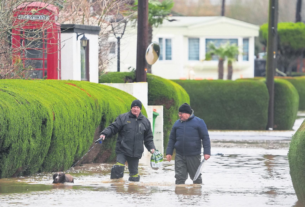In a world increasingly influenced by the perspectives of younger generations, teenagers have become vital contributors to political discussions. This change was highlighted by the winners of the Coming of Age in 2024 contest, whose engaging essays showcased their distinct viewpoints on politics and governance. Organized by The New York Times, the contest encouraged teenagers to express their thoughts on urgent political matters, igniting a dialogue about how the next generation sees their role in shaping society.
Voices of a New Generation
The essays submitted to the contest covered a broad range of concerns and hopes. From climate change and economic inequality to education reform and digital privacy, the topics chosen by participants demonstrated a profound understanding of both global and local challenges. These young writers not only showed a strong awareness of the issues but also a readiness to tackle complex ideas and suggest solutions.
Among the winners was a teenager from California who wrote about the relationship between technology and democracy. Her essay examined how social media platforms can serve as both tools for mobilization and sources of misinformation. She advocated for stricter regulations on tech giants to safeguard democratic institutions while also promoting digital literacy programs in schools to empower young users.
Another notable essay came from a student in Ohio, who emphasized the significance of voter accessibility. Drawing from her own experiences volunteering at polling stations, she urged for reforms to make voting more inclusive, such as extended hours and the implementation of mobile voting apps. Her heartfelt appeal highlighted the pressing need to eliminate barriers that disenfranchise marginalized communities.
A Shared Commitment to Change
What brought the contest winners together was their shared dedication to fostering a fairer and more equitable society. Many of the essays stressed the importance of systemic change over mere superficial solutions. One participant, a 17-year-old from Texas, highlighted the value of grassroots activism, drawing from her experiences in local climate protests. She argued that real change often begins at the community level and called for increased opportunities for youth to participate in civic activities.
The essays also conveyed a sense of urgency. With the world grappling with issues like worsening climate crises and political polarization, these teenagers expressed a strong determination to take action. Their writing was not only reflective but also forward-looking, proposing practical steps that individuals, communities, and governments could take to tackle these challenges.
Bridging Generational Divides
A prominent theme throughout the essays was the desire to bridge generational gaps. Many participants voiced their frustration with the slow pace of change in traditional political systems, attributing it to a lack of communication between older and younger generations. However, instead of taking a confrontational approach, these teenagers promoted dialogue and collaboration.
A winner from New York discussed the significance of intergenerational mentorship. Her essay shared her experiences working alongside older activists and how their insights helped her refine her advocacy strategies. She suggested creating more platforms for collaboration between young and old, merging the wisdom of experience with the enthusiasm of youth.
Inspiring Action Beyond the Page
The Coming of Age in 2024 contest was more than just a writing competition; it acted as a platform for young people to express their visions for the future. By amplifying these voices, the contest organizers aim to inspire action not only among teenagers but also among policymakers, educators, and community leaders.
The essays have already ignited discussions in classrooms and communities throughout the United States. Educators have utilized the winning entries as teaching resources, motivating students to engage in political conversations and critically assess their roles as citizens. Some participants have even joined local advocacy groups or initiated their own projects, turning their ideas into real-world actions.
The Power of Youthful Optimism
In an era when political dialogue can often seem divisive and stagnant, the essays from the Coming of Age in 2024 contest provide a refreshing viewpoint. They highlight the strength of youthful optimism and the necessity of listening to the younger generation. These teenagers are not merely future voters or leaders; they are actively involved in shaping the present.
Their voices, brimming with hope and resolve, urge us to reconsider our approach to politics and governance. As one winner beautifully expressed in her essay: “The future is not something we inherit passively; it’s something we build with intention.”




